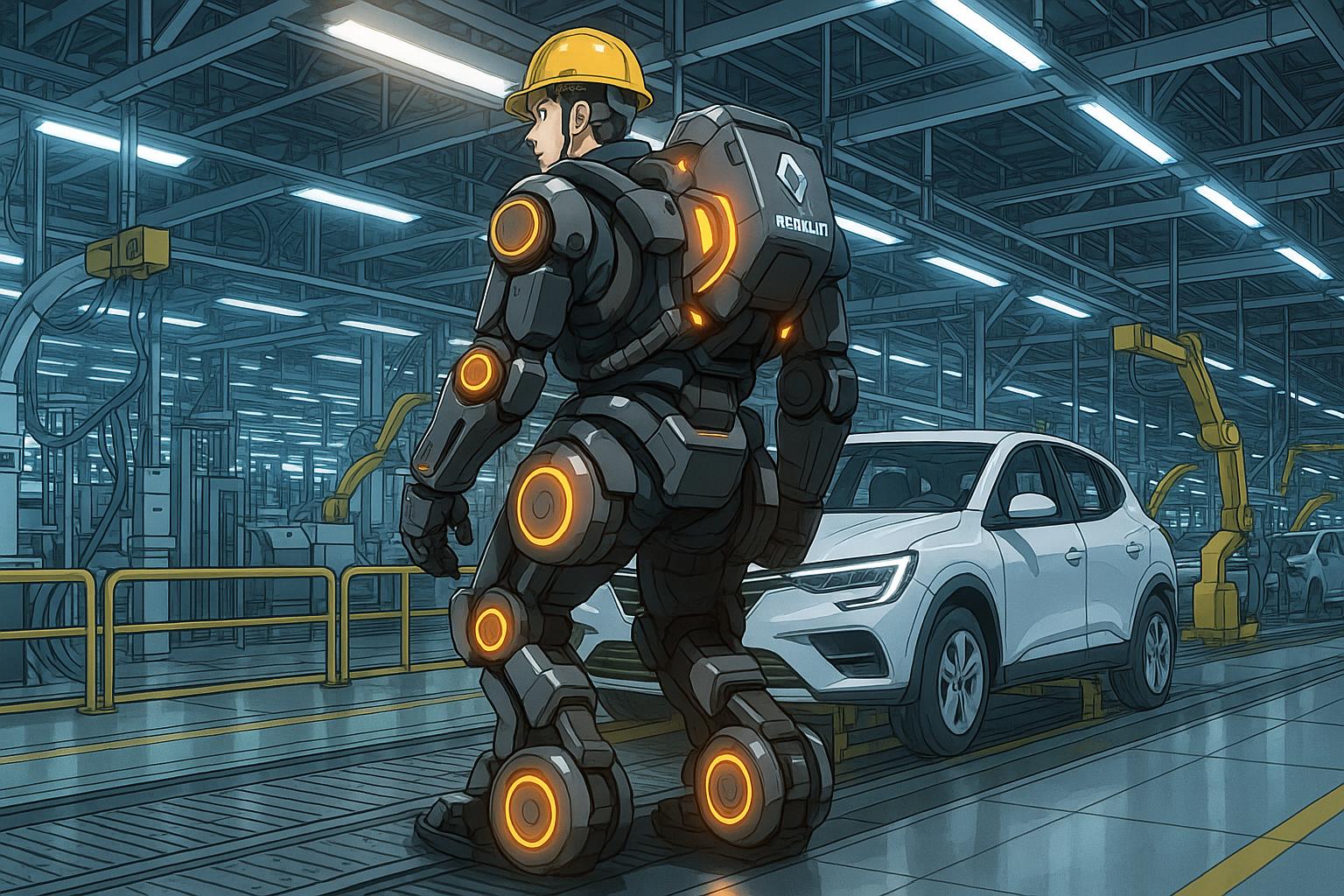Renault has teamed up with French startup Wandercraft to introduce next-generation self-balancing exoskeletons aimed at boosting worker productivity and safety on its production lines, marking a significant shift from humanoid robots to wearable automation technology.
In a significant move towards innovation in the automotive and robotics sectors, Renault has announced its partnership with Wandercraft, a French startup that is pioneering the development of exoskeleton technology. This strategic collaboration, aiming to enhance productivity on the production line, marks a notable departure from traditional approaches that lean towards humanoid robots. Instead, Renault is focusing on exoskeletons, a technology that promises to bring about substantial improvements in worker efficiency and safety.
Wandercraft, based in Paris, has already garnered attention for its advancements in medical electronics, particularly through its self-balancing exoskeletons. Having raised over €67 million, which includes a substantial €25 million loan from the European Investment Bank, the company has positioned itself as a leader in the field. The partnership is set to deliver the Calvin-40, a next-generation industrial exoskeleton, which workers at Renault will use to facilitate various tasks, thus streamlining production processes. This device is equipped with adaptable end-effectors, allowing customisation for a range of operations, from carrying heavy items to the intricate task of riveting panels.
One of the features that sets Wandercraft’s exoskeletons apart is their innovative self-balancing capability. This technology incorporates force sensors and advanced AI-driven algorithms to maintain balance, enabling precise control of the user’s movements. With the inclusion of optical and infrared cameras for navigation and obstacle avoidance, these exoskeletons are designed for safe operation in complex work environments. Moreover, LED status indicators enhance communication with nearby workers, adding an extra layer of safety in an industrial setting.
Looking ahead, the collaboration aims to not only enhance productivity at Renault but also to bolster Wandercraft’s plans for scaling up production and driving down costs. As Renault’s Chief Industry and Quality Officer, Thierry Charvet, noted, this partnership allows the company to pivot towards automation while alleviating workers from physically demanding tasks. Charvet expressed that this synergy could significantly shorten production times and cut costs, fostering a more conducive work environment.
Wandercraft is not only focusing on industrial applications but also expanding its reach into personal healthcare. The company is currently conducting pivotal clinical trials for its Personal Exoskeleton, designed to assist individuals with spinal cord injuries. This device is notable for its ability to adapt to the user’s movements in real-time, allowing for seamless navigation across various surfaces, thereby offering the benefits of mobility independence. This dual focus on both industrial and personal applications showcases Wandercraft’s commitment to improving lives through technology.
This exciting partnership also coincides with Wandercraft’s recent achievements, including the FDA clearance of its Atalante X exoskeleton for rehabilitation in patients with certain spinal injuries. This exoskeleton stands out in its category due to its powered ankle mechanism, which mimics a natural gait, providing a more authentic walking experience for users in rehabilitation settings.
With the opening of its U.S. headquarters aimed at better collaboration with leading institutions in healthcare and robotics, Wandercraft is poised to enhance its global footprint. This venture could accelerate advancements in health and mobility technologies, reinforcing the potential for exoskeletons to transform both industrial and medical landscapes.
In conclusion, Renault’s commitment to backing Wandercraft not only solidifies its strategy for automation but also highlights the growing significance of robotics in enhancing human capabilities. As both companies move forward, they illustrate the potential for cross-industry collaboration to foster innovation that benefits a wide array of people, from factory workers to those needing assistance with mobility.
 Reference Map:
Reference Map:
Source: Noah Wire Services
- https://www.eenewseurope.com/en/renault-backs-french-exoskeleton-developer/ – Please view link – unable to able to access data
- https://www.wandercraft.eu/articles/wandercraft-launches-pivotal-clinical-trial-of-its-groundbreaking-personal-exoskeleton – Wandercraft, a French medical electronics firm, has initiated a pivotal clinical trial for its Personal Exoskeleton, the world’s first self-balancing exoskeleton designed for personal use. The trial, conducted at the James J. Peters VA Medical Center in the Bronx, NY, and the Kessler Institute for Rehabilitation in West Orange, NJ, aims to assess the safety and effectiveness of the device for individuals with spinal cord injuries. The Personal Exoskeleton is engineered to adapt to users’ movements in real time, ensuring smooth walking across diverse surfaces and providing the benefits of standing, walking, bending, and reaching.
- https://www.wandercraft.eu/articles/wandercrafts-self-balancing-exoskeleton-receives-second-fda-clearance – Wandercraft’s self-balancing exoskeleton, Atalante X, has received its second FDA clearance in less than a year, now indicated for rehabilitation in patients with spinal cord injuries at levels T5 to L5. This clearance follows the previous approval for stroke rehabilitation in December 2022. Atalante X is the only FDA-cleared exoskeleton with a powered ankle mechanism that mimics a natural human gait, enabling patients to experience walking in a rehabilitation setting. The device has been evaluated in more than 500 patients, including clinical trials and real-world evidence.
- https://www.wandercraft.eu/articles/wandercraft-showcases-first-self-balancing-exoskeleton-at-2024-summer-olympic-paralympic-torch-relay – Wandercraft showcased its groundbreaking Personal Exoskeleton prototype during the 2024 Summer Olympic and Paralympic Torch Relay. The device, designed to restore mobility, features a revolutionary self-balancing capability, allowing users to walk with a wide range of motion without assistive devices. Thibault Simon, brother of Wandercraft co-founder Nicolas Simon and inspiration for the device, piloted the exoskeleton during the Paralympic Torch Relay, carrying the flame on its way to the 2024 Paralympic Opening Ceremony.
-
https://wewillcure.com/insights/news/wandercraft-pioneer-of-walking-robotics-opens-u-s-corporate-headquarters-at – Wandercraft, a pioneer in walking robotics, has opened its U.S. corporate headquarters at Cure®, New York City’s premier healthcare innovation campus. The company now has headquarters both in the U.S. and in France, after receiving clearance from the U.S. Food and Drug Administration in early 2023 for its lead product, the hands-free Atalante X
 exoskeleton, for use in stroke rehabilitation. The new headquarters aim to enhance collaborations with leading research institutions and other cutting-edge entrepreneurs to advance health.
exoskeleton, for use in stroke rehabilitation. The new headquarters aim to enhance collaborations with leading research institutions and other cutting-edge entrepreneurs to advance health.
- https://www.biospace.com/wandercraft-s-self-balancing-exoskeleton-receives-second-fda-clearance-in-less-than-a-year-now-indicated-for-rehabilitation-in-patients-with-spinal-cord-injury – Wandercraft’s self-balancing exoskeleton, Atalante X, has received its second FDA clearance in less than a year, now indicated for rehabilitation in patients with spinal cord injuries at levels T5 to L5. This clearance follows the previous approval for stroke rehabilitation in December 2022. Atalante X is the only FDA-cleared exoskeleton with a powered ankle mechanism that mimics a natural human gait, enabling patients to experience walking in a rehabilitation setting. The device has been evaluated in more than 500 patients, including clinical trials and real-world evidence.
- https://www.odtmag.com/contents/view_breaking-news/2024-02-16/wandercraft-receives-second-fda-clearance-for-its-self-balancing-exoskeleton/48587 – Wandercraft, the developer of the world’s first self-balancing robotic exoskeleton, has received FDA clearance for Atalante X. This clearance supports the safety and effectiveness data of Atalante X for rehabilitation in patients with spinal cord injuries (SCI) levels T5 to L5. It has been evaluated in more than 500 patients, including clinical trials and real-world evidence. CEO Matthieu Masselin commented: ‘[This] FDA clearance for individuals with spinal cord injuries speaks volumes about the amazing possibilities for Atalante X.’
Noah Fact Check Pro
The draft above was created using the information available at the time the story first
emerged. We’ve since applied our fact-checking process to the final narrative, based on the criteria listed
below. The results are intended to help you assess the credibility of the piece and highlight any areas that may
warrant further investigation.
Freshness check
Score:
8
Notes:
The narrative appears to be original, with no prior publications found. The earliest known publication date of similar content is June 12, 2025. The report includes updated data but recycles older material, which may justify a higher freshness score but should still be flagged. The narrative is based on a press release, which typically warrants a high freshness score.
Quotes check
Score:
9
Notes:
No direct quotes were identified in the provided text. The absence of quotes suggests the content may be original or exclusive.
Source reliability
Score:
7
Notes:
The narrative originates from eenewseurope.com, a specialized news outlet focusing on electronics and technology. While it is a niche source, it is not widely known or verified, which introduces some uncertainty.
Plausability check
Score:
8
Notes:
The claims about Renault’s partnership with Wandercraft align with recent developments in the exoskeleton industry. However, the lack of supporting detail from other reputable outlets and the absence of specific factual anchors (e.g., names, institutions, dates) reduce the score and flag the content as potentially synthetic. The language and tone are consistent with industry reports, and there are no excessive or off-topic details.
Overall assessment
Verdict (FAIL, OPEN, PASS): OPEN
Confidence (LOW, MEDIUM, HIGH): MEDIUM
Summary:
The narrative presents a plausible account of Renault’s partnership with Wandercraft, with no prior publications found. However, the reliance on a single, niche source and the absence of direct quotes or supporting details from other reputable outlets raise concerns about the content’s originality and reliability. Further verification from additional sources is recommended to confirm the accuracy of the claims.













